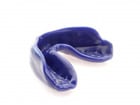 When it comes to personal hygiene, without question one of the most common and unpleasant qualities is bad breath. Having breath that smells can be very unpleasant for others and make you significantly less attractive to the opposite sex. What most people don’t realise however, is that in over 90 per cent of cases, bad breath is caused by poor standards of oral hygiene and easily treated.
When it comes to personal hygiene, without question one of the most common and unpleasant qualities is bad breath. Having breath that smells can be very unpleasant for others and make you significantly less attractive to the opposite sex. What most people don’t realise however, is that in over 90 per cent of cases, bad breath is caused by poor standards of oral hygiene and easily treated.
The smell itself is caused by decaying bacteria or food matter that is stuck between the teeth and in the grooves of the tongue. This releases nasty smelling sulphurous chemicals which are carried out on the breath. These bacteria and chemicals can easily be stopped with more effective brushing and flossing. If you are unsure about the proper oral hygiene methods you can ask advice from a Central Leeds dentist who can instruct you how to properly clean your teeth.
The two most important factors are brushing twice a day for three minutes with a suitable brush held at a 45-degree angle to the teeth. This removes bacteria and food from the surface of the teeth, helping to prevent bad breath. Flossing the gaps between the teeth removes other debris that is hard to reach with a normal brush and cleans below the gum line.
Other dental hygiene tools may be used such as inter-dental brushes or mouthwash but it is always a good idea to consult your dentist before using these products. In some cases mouthwash can remove some of the saliva production from the mouth making the problem worse.





 Having a tooth extraction is a pretty unpleasant experience in itself and you no doubt would expect some discomfort for a few days afterwards, but if the pain doesn’t go away, and even begins to get worse, you might be suffering from another condition called dry socket.
Having a tooth extraction is a pretty unpleasant experience in itself and you no doubt would expect some discomfort for a few days afterwards, but if the pain doesn’t go away, and even begins to get worse, you might be suffering from another condition called dry socket. Having white teeth is integral to having a beautiful smile, and everybody wants to have a beautiful smile. Teeth whitening procedures have been around for many years but it is only in the last few that the treatment has become more widespread and acceptable.
Having white teeth is integral to having a beautiful smile, and everybody wants to have a beautiful smile. Teeth whitening procedures have been around for many years but it is only in the last few that the treatment has become more widespread and acceptable. Gum disease is the infection of the gingival tissue that surrounds and supports teeth and occurs in two stages called gingivitis and periodontitis.
Gum disease is the infection of the gingival tissue that surrounds and supports teeth and occurs in two stages called gingivitis and periodontitis. There are many options available for patients wishing to straighten uneven or overcrowded teeth. Twenty years ago the choice was limited and usually involved unpleasant fixed metal braces that were fitted for periods of up to two years. Today patients have the choice of braces offering treatments which are incredibly discreet, powerful, fast or a combination of all three. One such option is called the Inman aligner and is clinically proven to reduce overall treatment time by as much as 75 per cent.
There are many options available for patients wishing to straighten uneven or overcrowded teeth. Twenty years ago the choice was limited and usually involved unpleasant fixed metal braces that were fitted for periods of up to two years. Today patients have the choice of braces offering treatments which are incredibly discreet, powerful, fast or a combination of all three. One such option is called the Inman aligner and is clinically proven to reduce overall treatment time by as much as 75 per cent. Very few people are ever thrilled about having to wear braces, even though they want to have straight teeth. The prospect of wearing a fixed metal brace for two years is never a pleasant one yet many people are willing to do it to have the perfect smile, but there are alternatives. Invisalign is a revolutionary system for straightening teeth that are unevenly spaced or overcrowded which does away with the need for fixed brackets and metal wires.
Very few people are ever thrilled about having to wear braces, even though they want to have straight teeth. The prospect of wearing a fixed metal brace for two years is never a pleasant one yet many people are willing to do it to have the perfect smile, but there are alternatives. Invisalign is a revolutionary system for straightening teeth that are unevenly spaced or overcrowded which does away with the need for fixed brackets and metal wires. Teeth that are discoloured, unevenly spaced or worn down look unhealthy and can add years on to the age of the patient. Once tooth enamel has been stained or worn it cannot be grown back or effectively cleaned. One option to restore the appearance of a healthy smile is to have a set of porcelain veneers fitted. Veneers are thin ceramic caps that fit over the top of existing teeth giving the appearance of real teeth. Because they are manufactured, they can be designed to specifically fit your individual teeth giving an even and bright look to your smile.
Teeth that are discoloured, unevenly spaced or worn down look unhealthy and can add years on to the age of the patient. Once tooth enamel has been stained or worn it cannot be grown back or effectively cleaned. One option to restore the appearance of a healthy smile is to have a set of porcelain veneers fitted. Veneers are thin ceramic caps that fit over the top of existing teeth giving the appearance of real teeth. Because they are manufactured, they can be designed to specifically fit your individual teeth giving an even and bright look to your smile. For patients who are denture wearers, the fear of your dentures falling out at inopportune moments can be a real source of worry and anxiety. Many denture wearers resort to wearing sticky and messy dental adhesive strips and gels for that added feeling of security. There is an alternative that can put your mind at rest and involves no unnecessary fuss or adhesives. Mini-dental implants are a series of small screws anchored into the jawbone to which dentures can be snapped on and off.
For patients who are denture wearers, the fear of your dentures falling out at inopportune moments can be a real source of worry and anxiety. Many denture wearers resort to wearing sticky and messy dental adhesive strips and gels for that added feeling of security. There is an alternative that can put your mind at rest and involves no unnecessary fuss or adhesives. Mini-dental implants are a series of small screws anchored into the jawbone to which dentures can be snapped on and off. Mouth guards are protective devices worn over the teeth to prevent dental injury. They are often worn during sporting activity and to protect teeth against sun-conscious grinding, known as bruxism.
Mouth guards are protective devices worn over the teeth to prevent dental injury. They are often worn during sporting activity and to protect teeth against sun-conscious grinding, known as bruxism. Maintaining a good standard of oral hygiene can help keep teeth and gums healthy for life, reducing the risk of dental decay and gum disease and saving you from the pain and cost of dental treatment in the future. Oral hygiene is usually understood to mean keeping a clean and healthy mouth by regular brushing and flossing and by keeping up regular six-month check ups with the dentist.
Maintaining a good standard of oral hygiene can help keep teeth and gums healthy for life, reducing the risk of dental decay and gum disease and saving you from the pain and cost of dental treatment in the future. Oral hygiene is usually understood to mean keeping a clean and healthy mouth by regular brushing and flossing and by keeping up regular six-month check ups with the dentist.

